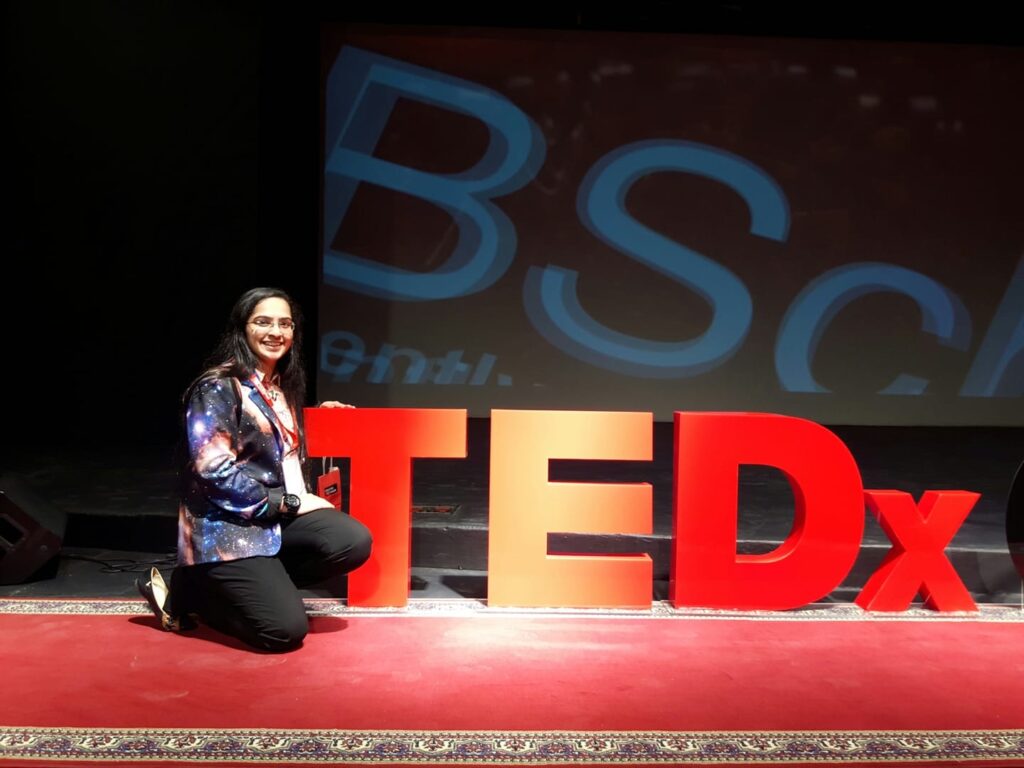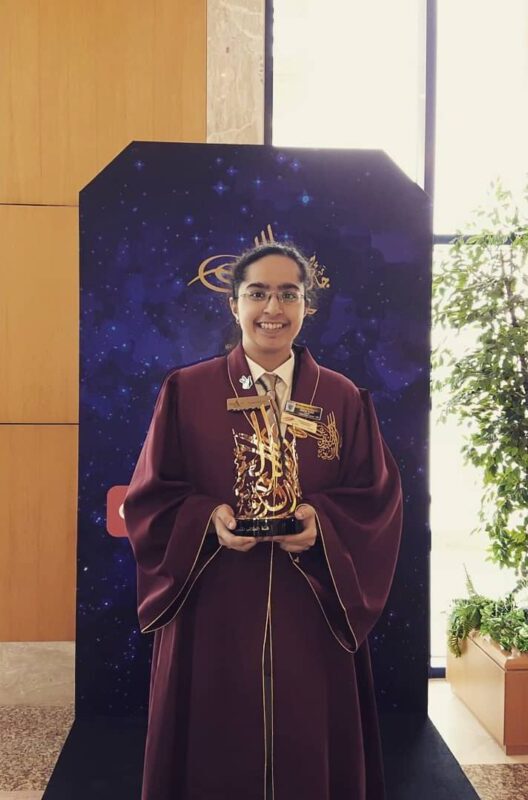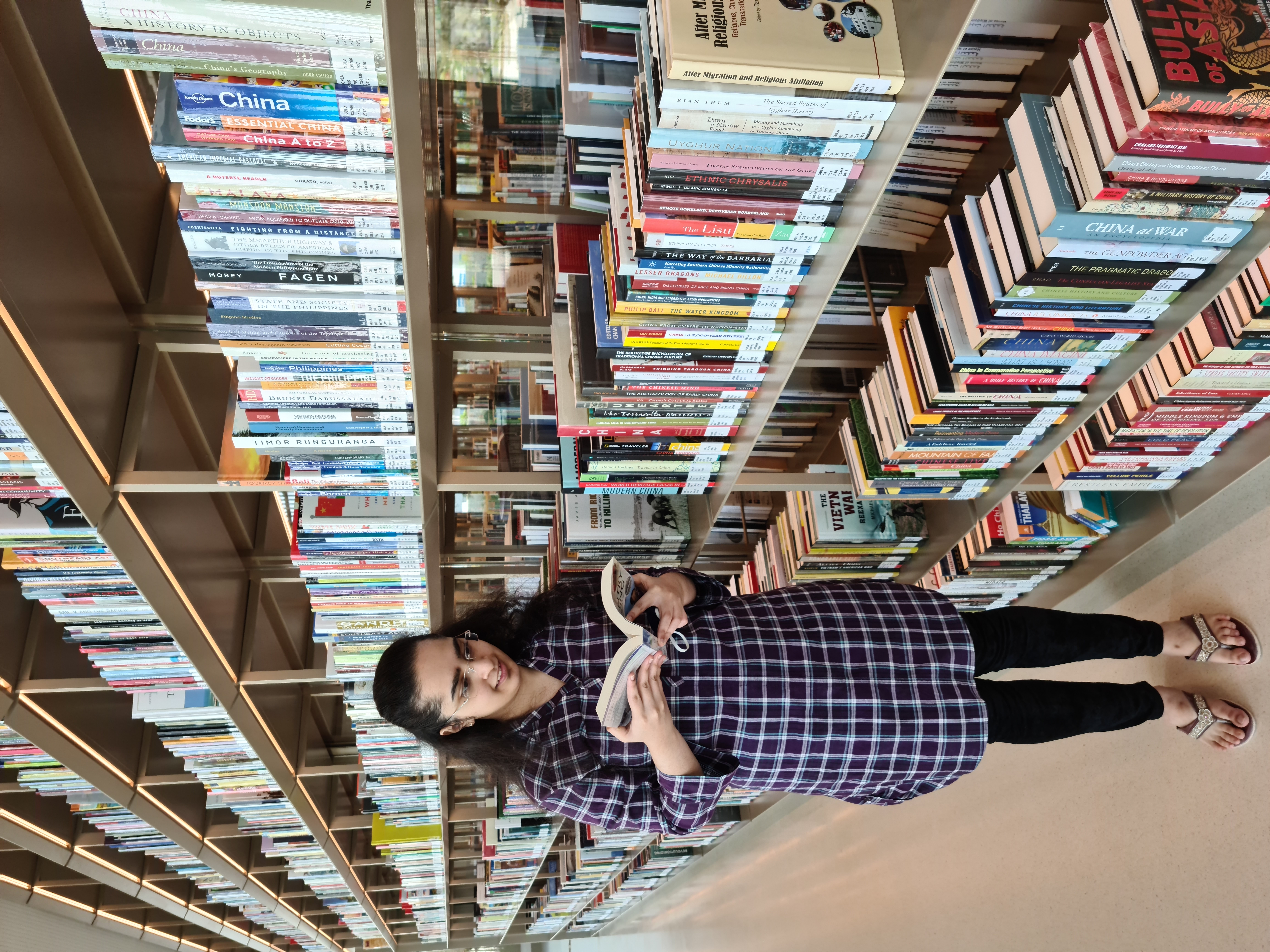Interview by Anika Mukker
Do you know what you would like to pursue in the future, beyond university, or is that still unclear?
I’m what you call a multipotentialite. A multipotentialite is someone who has a diverse range of interests and finds it hard to zero in on one career or one path to getting somewhere. I have that kind of personality. My goal at the moment is to work at the intersection of STEM and public policy, like neuroeconomics, science diplomacy, etc. I’m still exploring which exact field I would like to go in, but that’s the direction that excites me.
A lot of stuff like AI is coming up. You have cryptocurrency and blockchains. You also need policy around all of that. It’s a field opening up pretty far and wide.

Do you want to talk a little bit about what Mind Champs is — the people, experiences, or events that led you to start that initiative?
Sure! I was part of the 1000 girls 1000 futures mentorship program with the New York Academy of Science in 2018.
I was part of this platform, talking to girls across the world. In our conversations we realized that regardless of our geographic boundaries, mental health is still a taboo.
We started by creating an e-magazine to raise awareness about the topic. We were around 7 to 8 girls who started it off as a 2-3 month project, but after the first edition came out, the response was so overwhelming and beautiful that we decided to carry it on and take it to the next level. A lot of the initial set of founders aren’t with us anymore, but we started reaching out to young people in our community to see if they wanted to join us.
I remember putting “the co-founder and CEO of Mind-Champs” on my LinkedIn profile and someone reached out to me and said “can you give me an internship at your organization?” My response internally was, do we even have an organization? Something clicked after that moment, and we started buckling down and getting team structures in place, creating channels to get things done efficiently. Then we started reaching out to other organizations and partnering with them for projects. Later we started working with experts, doing events with them ,and getting them to offer free counselling sessions for young people who couldn’t afford them.
Mind Champs focuses on 3 core aspects of mental health: awareness plus inclusion and accessibility. Awareness is stigmatization. Inclusion refers to inclusive narratives. A lot of times when you look for mental health resources online, you find a lot of resources pertaining to the western world, specifically white cishet men. Most of the research has been conducted in that space. But, what happens is that the narratives of women, narratives of people in South Asia, narratives of minority communities get left out. When you search for things online and you don’t find narratives that you can relate to, you feel excluded from the mental health space. Then, looking at accessibility, it’s not just knowing where the resources are but being able to access and utilize them.
We recently registered ourselves as a nonprofit, and we’re working on creating innovations in this space, going beyond awareness, inclusion, and accessibility and into solutions — a couple of exciting things in the pipeline.
Why is it so important for us as a society, and on community levels, to act on the importance of mental health?
I come from a family where I’ve seen my uncle suffer from schizophrenia. He wasn’t able to receive treatment for over a decade because of the stigma around it. I saw firsthand how badly he was suffering because of that, and I wanted to learn more about mental health. That’s where the purpose of MindChamps stems from. Mental health is often brushed under the carpet. A lot of times people from older generations don’t take the topic very seriously.
We have quite a long way to go on the road of making health an integral part of our communities. Even now, we have things like World Mental Health Day but we still brush the topic to the side. Conversations need to start at home and at school where they painfully don’t happen. Currently, there’s nowhere in the status quo where mental health is prioritized and recognized. That’s the sort of issue with mental health as a whole. From a perspective, mental health shouldn’t be separated from physical health. When someone has a fever, there’s no objection to them taking a few days off. When someone is struggling with real mental health issues, people are suddenly not okay with them taking a break. That’s the sort of culture we’re trying to change through MindChamps.
Even within the MindChamps community, it’s not like I and the other members don’t have biases. We do. That’s why we also have training programs, so we ourselves can learn. Even people like me, who are advocates for mental health, still have our biases. But personally, I’m working on it. I think everyone needs to take it from an individual perspective as opposed to the HR exercises.
We view productivity from a very capitalistic point of view. We value the hours of work over the quality of work. There’s this association between hours of work and success, and that’s the sort of mindset we need to break and go beyond.

Since a lot of problems associated with mental health can be traced to societal structures and norms, how can we, on an individual level, take steps to protect our own mental health when doing so might not be widely accepted in group or community settings? Not necessarily in terms of professional advice, but based on your experience.
I think the first step is to recognize your emotions, stick with them, embrace them, and not push them away. For example, I am feeling sad. I’m recognizing why I’m sad, and I’m exploring where that sadness comes from. I accept that I’m sad. Accepting emotions and letting them sink in is the first step. When you tell yourself to ignore your feelings, push your sadness to the corner and tell yourself you’re happy, the most harm is done. When you yourself are not recognizing your feelings, someone else can’t accept them as well.
Then I think you can try to write down what you’re feeling. This helps me a lot. A lot of times you know what you’re feeling, but you are not in a position where you can tell someone exactly what you’re feeling. You’re not able to put your emotions into words. That’s when writing helps a lot because you don’t have to tell anyone else. When you write, you do it for yourself. I know that people who might not be into writing so they go and paint or go out and run or do something to let out those feelings. I think it’s very important that you let out things that you want to let out. You should also always be reaching out to someone. We’re a planet of 7.6 billion people, and there must be someone you can reach out to. If there’s no one in your immediate community, you can even tap into online communities to talk anonymously with other people or even with professionals. Technology has taken us beyond our immediate communities, so we should make use of it. We should also recognize how other people around us feel. Often we speak to friends without recognizing how they’re feeling. Try to recognize. Ask questions. Be open., Be a good listener when you can.

Shifting into another topic of discussion, how important is it for young people to exercise the power in their voices? You’ve commented a lot on how politics has so often been rendered to name calling and shaming “opponents” as opposed to their policy related positions. How can GenZ shift that perspective and use their voices and experiences to do so?
A lot of times young people are asked not to speak about serious topics because we’re “inexperienced.” Don’t speak when adults are speaking. Don’t speak about adult stuff. When growing up, it’s challenging to break away from that. That’s what, I think, allows a select group of people to have such control over larger communities, essentially because the majority of us have been shut down as young people. When we grow up, we’re not sure of how to use their voice.
That’s why it’s so important for young people to find their voices, to empower each other to use their voices, and to speak up about issues that matter. Speaking up can even be as simple as watching a movie and saying that this dialogue was sexist or racist. That’s where activism starts from, the really small stuff. When you start noticing these little things, you build your capability to address/recognize bigger things.
I think our generation, GenZers, are pretty receptive to a lot of stuff happening in the world. We’re very observant. We know what’s going on. We want to know what’s going on. We want to be involved in the decision making process to a large extent. You can see the climate strikes. Even in India, you have activists speaking against certain laws.
With political opinions, we need to start recognizing the spectrum. That’s something young people are doing well. We’re open to sitting down and having conversations with people who potentially disagree with us. Of course there are a lot of people in our generation who are trolling people on social media, posting hate comments, engaging in hateful activities. I wouldn’t diminish them at all. But to a large extent, our generation is receptive to conversation with people we disagree with, to discuss our ideas without getting into a fight. That’s something we all need to do, and it stems from empathic listening. We shouldn sit down and listen to someone whose opinions we don’t necessarily agree with without telling ourselves that they are trying to convert us to their beliefs. You can listen open mindedly and still stick with your beliefs at the end of the conversation but still understand where the other person’s opinion comes from. A lot of times, our opinions are shaped by our personal experiences, the things that we read, the culture that we’re exposed to. We can’t expect people to change that in a single conversation.
That’s where the change can start: listening empathically, reading articles by people who don’t have the same opinions as you so you can understand where their beliefs come from and why they think they do. Instead of seeing others as “opponents,” see them as people you can engage with.

You’ve mentioned that you’re born in India, but you came to the UAE when you were really young. How have your cultures shaped your perspective, your advocacy, the change you want to make, etc.?
India is a country very rooted in traditions and ancient civilizations. A lot of times rituals have a big role to play in Indian culture. There are long standing belief systems, a lot of which are misrepresented or misunderstood because of colonialism, but, nonetheless, a lot of ancient traditions that mean a lot. The UAE, particularly Dubai, appears as this symbol of modernity. There is a lot of ancient history and culture, but the UAE is in a position to become one of the greatest global powers. In the last 50 years, the UAE was founded in December 1971, in spite of being such a young nation, we’ve come a long way. From the barren desert we’ve built the tallest building. That takes a lot of vision, futuristic thinking, and determination. Traditionally, hospitality is a big part of Indian and UAE cultures.
It’s a beautiful blend. I’ve taken a lot of tradition from my Indian roots and futuristic thinking, youth empowerment, critical thinking, ideation, and innovation from the UAE, in the UAE. I’ve seen the UAE grow with me, and that’s the best thing a young person can experience. This sort of mixed culture growing up has really shaped me into the person I am today, and it’s still shaping me.
Connect with Anagha!
Instagram: @anagha02raj
Stay connected with Project Hearth by following us @project.hearth on Instagram


